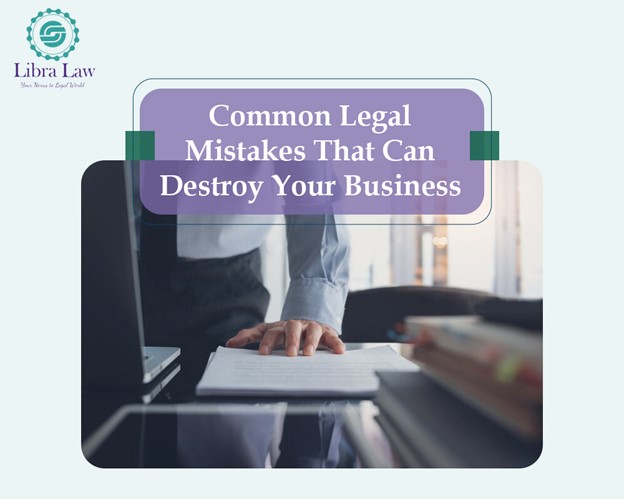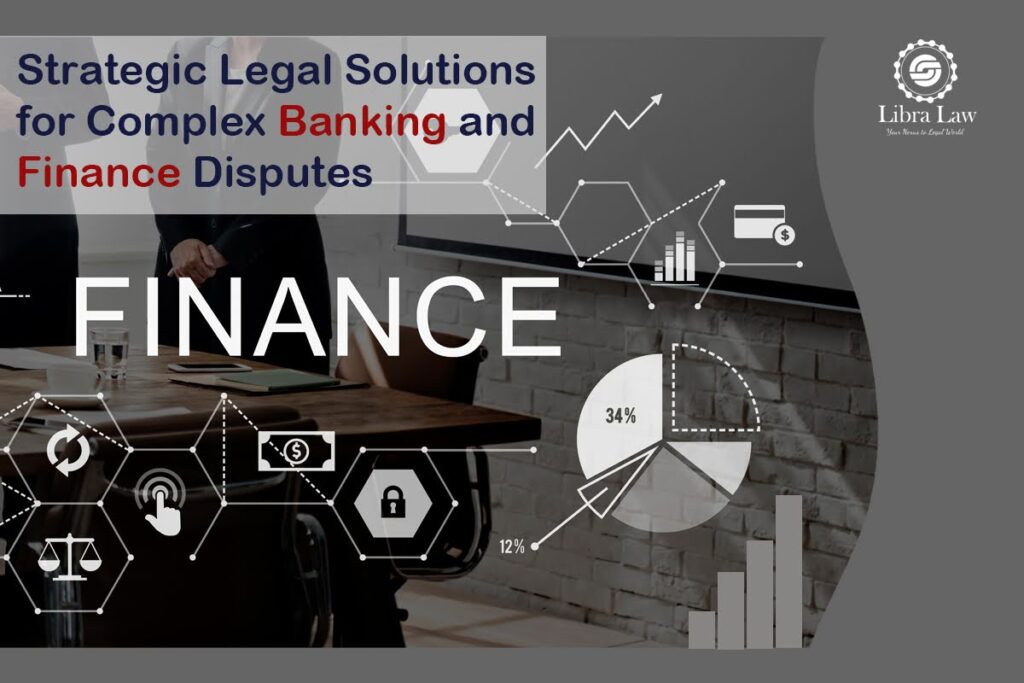As a business owner, it’s easy to overlook the potential legal pitfalls that could derail your company’s growth or even lead to costly disputes. However, understanding and addressing legal issues from the outset is crucial for protecting your business, its assets, and its reputation. In this article, titled Top Legal Mistakes Businesses Make and How a Law Firm Can Help You Avoid Them, we will dive into some of the most frequent legal errors businesses encounter, particularly in areas such as international trade and explore how proactive legal guidance can not only help you avoid these risks, but also position your company for long-term success.
Whether you’re in the early stages of your business or managing an established operation, this advice will be invaluable in safeguarding your enterprise. At LibraLaw, our legal experts are committed to helping you navigate the complexities of business law and ensuring that you avoid common mistakes many entrepreneurs unknowingly make.
Why is Understanding Business Law Essential for Your Company’s Success?
Business law refers to the body of rules, regulations, and principles that govern how businesses are formed, operated and dissolved; It encompasses a wide range of legal fields, from contract law and corporate governance to labor regulations and international trade rules. These legal frameworks provide a predictable and secure environment for businesses, ensuring that rights and obligations are clearly defined and enforceable.
For companies, understanding business law is far beyond merely checking off legal requirements. Business law directly impacts critical aspects of business strategy, risk management and long-term sustainability. Below are some of the reasons why business law is so crucial for companies:
1. Choosing the Right Business Structure
One of the first decisions a business must make is its legal structure. Whether it’s a sole proprietorship, partnership, corporation or limited liability company (LLC), the choice will significantly affect taxation, liability and the ability to raise funds. For example, an LLC can provide personal liability protection, whereas a sole proprietorship leaves the business owner personally exposed to debts and liabilities. The right legal structure can minimize taxes and potential liabilities, ensuring that the company is well-positioned for growth and long-term sustainability.
2. Ensuring Enforceable Contracts

Every business operates based on contracts, whether they are with suppliers, customers, partners, or employees; These contracts outline the terms of the business relationship and establish the rights and obligations of each party. However, poorly drafted contracts or vague terms can lead to disputes, financial losses or even lengthy litigation. By ensuring that contracts are clearly written, precise and legally enforceable, businesses can avoid costly legal battles and maintain positive working relationships with their partners and clients.
If you’re interested in learning more about how to draft and enforce business contracts effectively in Iran, we recommend reading our article «Business Contracts in Iran; Strategies to Protect Your Interests» for in-depth guidance.
3. Managing Employment Law Compliance
Businesses must comply with a variety of labor and employment laws, such as those governing hiring, firing, wages, workplace safety and anti-discrimination policies. Failure to comply with employment regulations can result in costly lawsuits, fines and reputational damage.
For example, misclassifying employees as independent contractors can lead to significant penalties and back payments of wages. By having a sound understanding of employment law, companies can protect themselves from legal disputes and ensure fair treatment for their employees.
For a deeper dive into how businesses can avoid common employment law pitfalls, you can refer to our article «Employment and Labor Law in Iran; Avoid Legal Mistakes Before You Face Them».
4. Avoiding Violations of Competition Law
Competition law or antitrust law, is designed to ensure that businesses compete fairly in the marketplace. Violating competition law, such as engaging in monopolistic practices or price-fixing agreements, can result in heavy fines, sanctions and even criminal charges. Additionally, anti-competitive behavior can damage a company’s reputation and harm customer trust. By staying compliant with competition regulations, businesses can foster fair competition and avoid significant legal risks.
5. Navigating Tax Obligations

Business law also involves understanding tax laws — both domestic and international. A business must comply with tax regulations and ensure proper reporting of income, expenses and other taxable activities. Without proper tax planning and compliance, companies can face tax audits, fines and penalties that can drain financial resources. Businesses that plan their taxes strategically and ensure compliance with local and international tax rules can minimize their liabilities and ensure long-term financial stability.
If you want to learn more about navigating Iranian tax laws, especially for foreign investors, be sure to check out our article, titled «A Practical Guide to Iranian Tax Laws for Foreign Investors».
6. Protecting Intellectual Property (IP)
Intellectual property is often one of the most valuable assets a business owns; This includes trademarks, patents, copyrights, and trade secrets. Failure to protect IP can lead to unauthorized use, infringement and loss of competitive advantage.
For example, if a business develops a unique product or service and fails to patent it, competitors could replicate it and capture market share. Understanding and implementing IP protection strategies ensure that a business’s innovations and brand identity are legally protected, reducing the risk of theft or infringement.
If you want to learn more about how to protect your intellectual property, especially in Iran, refer to our article «Protect Your Business; Essential Strategies for Safeguarding Intellectual Property in Iran».
7. Managing Commercial Disputes
Disputes are inevitable in business. Whether it’s a contract breach, a disagreement with an employee or a conflict with a supplier, businesses must be prepared to handle legal disputes efficiently. As discussed in our article «Key Insights into Commercial Arbitration Every Business Owner Should Know», understanding commercial arbitration is crucial for minimizing legal risks in business. Additionally, effective dispute management can help preserve business relationships and protect the company’s reputation.
8. Navigating International Trade and Cross-Border Transactions
For businesses expanding into international markets, understanding international trade law is essential; This includes knowledge of customs regulations, import/export laws and cross-border contracts. Failing to comply with international regulations can result in delays, fines and even the inability to conduct business in certain regions. Legal guidance on cross-border trade ensures that businesses can operate globally while minimizing risks and maximizing opportunities for growth.

9. Risk Mitigation and Long-Term Sustainability
The ultimate goal of understanding business law is to mitigate risks and ensure long-term sustainability. By proactively addressing legal concerns, businesses can reduce the likelihood of costly lawsuits, regulatory fines and reputational damage. Legal foresight enables companies to identify potential risks before they escalate and take preventive measures to safeguard the business. Whether it’s through proactive contract management, tax planning or intellectual property protection, a strong legal foundation helps businesses maintain stability and thrive in a competitive marketplace.
What Are the Key Areas of Business Law Every Company Must Master?
Business law is vast and covers multiple areas that are critical to a company’s operations and growth. Here are the key areas that every business should be familiar with:
- Contract Law
Every business relies on contracts — whether with clients, suppliers, partners or employees. Poorly drafted contracts can lead to disputes, payment delays and even lawsuits. A well-drafted agreement ensures that obligations are clear, enforceable and legally protected, helping to avoid unnecessary conflicts and legal challenges.
- Corporate and Entity Law

Choosing the right legal structure for your business is essential. Whether it’s an LLC, corporation or partnership, the legal structure you select impacts taxation, liability, governance and even future funding opportunities. Legal counsel helps align your business model with your long-term goals, ensuring that you’re set up for growth and compliance.
- Employment Law
Hiring, managing, and terminating staff require strict adherence to labor regulations. Employment law helps ensure that your business complies with laws regarding wages, workplace safety, benefits and employee rights. Mistakes in this area can lead to costly lawsuits, penalties and damage to your company’s reputation; so it’s essential to have proper guidance.
- Competition and Antitrust Law
In a competitive marketplace, businesses must operate fairly. Antitrust laws prevent monopolistic practices, collusion and market manipulation. Violating these laws can result in hefty fines, reputational damage or even the dissolution of your business. Staying compliant with competition law ensures that your business thrives in a fair and legal environment.
- Tax Law
Tax planning goes beyond just keeping books; it’s about strategy. Proper understanding of both domestic and international tax obligations ensures that your business remains financially healthy and avoids costly audits or penalties. Tax law helps businesses navigate complex rules to maximize savings and maintain legal compliance.
- Intellectual Property Law
Intellectual property (IP) is one of a business’s most valuable assets. From trademarks to trade secrets, IP law ensures that your ideas, inventions and brand identity are protected from theft or infringement. Protecting your intellectual property can help maintain your competitive edge and secure your business’s future growth.
- Commercial Litigation and Dispute Resolution
Disputes are sometimes inevitable, whether with clients, suppliers or other businesses. Understanding litigation risks and exploring alternative dispute resolution methods can help you save time, money and reputation. Having a strategy in place can often prevent disputes from escalating into long and costly legal battles.
- International Business Law
If you’re expanding across borders, international business law becomes increasingly important. Navigating foreign investment rules, customs regulations and cross-border contracts requires a solid legal strategy. Legal guidance helps reduce uncertainty and ensures that you comply with international laws while expanding your business globally.
At LibraLaw, we provide integrated legal support across all these areas. Our expertise ensures that your business can operate with confidence, mitigate risks and scale successfully, no matter how complex the challenges become.
What Are the Most Common Legal Mistakes That Can Harm Your Business and How to Avoid Them?

Many businesses, particularly startups and small enterprises, often overlook the importance of early legal planning; This neglect can lead to costly mistakes that could have been easily avoided with proper legal guidance. Below are some of the most common legal pitfalls that can harm your business and how to avoid them:
1. Not Putting Agreements in Writing
Verbal agreements, while seemingly simple and based on trust, are rarely enforceable in court. Whether you’re dealing with a supplier, co-founder, or freelance consultant, always ensure that any agreement is documented in a clear, written contract. Written contracts protect both parties by outlining responsibilities, expectations and legal recourse in case of a dispute. Without this protection, your business could face difficulties in resolving conflicts and enforcing terms.
2. Choosing the Wrong Business Structure
Many businesses make the mistake of registering as sole proprietors when a more suitable structure, like a Limited Liability Company (LLC), could provide better protection. The right choice of business entity can affect your taxes, personal liability, governance and how investors view your business. A business structure such as an LLC shields personal assets from business liabilities and can offer tax advantages, making it essential to choose the right one from the start.
3. Ignoring Employee and Contractor Classification Rules
Misclassifying workers as independent contractors when they should be employees can lead to legal disputes, fines and back wages. The rules around employee and contractor classification can be complex, and failing to comply can result in costly penalties. To avoid this, ensure that your HR processes and contracts align with employment laws. Legal counsel can help you structure your workforce properly and prevent potential misclassification issues.
4. Overlooking Intellectual Property (IP) Protection

Startups often delay protecting their intellectual property, such as trademarks, patents and proprietary software. Failing to secure your IP early leaves your brand and inventions vulnerable to theft or infringement, which could lead to costly legal battles. Ensure that your IP is protected by registering trademarks, copyrights and patents as necessary. Early protection allows you to defend your competitive edge and prevents future disputes over ownership.
5. Non-Compliance with Licensing and Permits
Operating without the necessary licenses or permits can result in business closure, fines, or other penalties. Different industries and regions have different regulatory requirements, and failing to comply with these can halt your business operations. It’s essential to verify that you have all the required licenses and permits in place before starting or expanding your business. Consulting a legal expert can help ensure that you stay compliant with all applicable local and national regulations.
6. Using Online Templates for Legal Documents
While using online templates for contracts and agreements may seem like a cost-effective solution, these generic forms often don’t account for specific business needs, jurisdictional nuances or the unique circumstances of your company. A DIY approach to legal documents can expose your business to risks and loopholes. To protect your interests, always work with a lawyer who can tailor contracts to your business’s unique needs and legal environment.
Proactive legal planning can save your business from major issues down the road. While the costs of handling legal matters reactively can be high, preventing these issues from arising in the first place is much more affordable and efficient. At LibraLaw, we help businesses identify potential legal risks early on, so you can address them before they turn into serious problems. By taking the right legal steps today, you can protect your business and set it up for long-term success.
What Legal Risks Could Threaten Your Business’s Success?

Businesses, regardless of their size or industry, face a range of legal risks that can significantly impact their operations and reputation. Below are the key legal risks businesses should be aware of and how legal advisors can help mitigate them:
1. Contractual Risk
Poorly drafted or vague contracts are a significant source of legal disputes. Ambiguous terms can lead to disagreements over payment, delivery and other essential business obligations; These issues often result in lengthy and costly litigation.
Legal experts ensure that your contracts are clear, precise, and enforceable; They help draft agreements that protect your interests, clearly define the rights and obligations of all parties and ensure the terms comply with applicable laws, reducing the potential for future disputes.
2. Regulatory Compliance Failures
Many businesses, particularly startups, can run into trouble when they fail to comply with industry-specific regulations. For example, health-tech companies must adhere to privacy laws like the General Data Protection Regulation (GDPR) in the EU or the Health Insurance Portability and Accountability Act (HIPAA) in the U.S. Non-compliance with these regulations can result in heavy penalties and reputational damage.
Legal advisors guide businesses through the complexities of regulatory frameworks; They help ensure your business complies with the necessary rules, whether it’s data privacy, consumer protection, environmental regulations or industry-specific guidelines. Staying compliant with the law not only protects you from fines but also builds trust with customers.
3. Employment Law Violations
Employment law violations are a common issue that can result in lawsuits, fines and damage to your company’s reputation. Misclassifying employees as independent contractors, ignoring minimum wage laws or failing to adhere to workplace safety standards can lead to costly legal consequences.
Lawyers provide proactive advice on employment law, ensuring that your business practices align with local labor laws; They help with drafting employee contracts, creating workplace policies and ensuring compliance with regulations regarding minimum wage, overtime pay, workplace safety and other employee rights. Preventive legal audits can also identify potential violations before they escalate into significant problems.

4. Intellectual Property Risks
Intellectual property (IP) violations can occur when a company unknowingly infringes on another’s patents, trademarks or copyrights. Launching a product or service without ensuring your IP is properly protected can lead to costly infringement claims.
Business lawyers assist in registering and protecting your intellectual property; They help secure patents, trademarks, copyrights and trade secrets, ensuring that your business’s innovations and brand identity are legally protected. By conducting thorough IP audits and providing ongoing monitoring, they help avoid infringement risks and potential legal battles.
5. Cross-Border Legal Conflicts
Expanding into international markets presents a unique set of legal risks. Failure to understand local laws related to imports, consumer protection or tax treaties can expose your business to penalties, operational delays or lawsuits.
Legal counsel ensures that your business complies with international laws and regulations when expanding across borders. Whether it’s understanding foreign tax regimes, import/export restrictions or cross-border contract enforcement, lawyers can navigate the complexities of international trade; They help mitigate risks associated with operating in multiple jurisdictions, ensuring that your business is legally compliant and able to succeed in global markets.
Understanding the legal risks that businesses face is essential for long-term success and sustainability. By working with experienced business lawyers, companies can proactively address these risks, protect their assets and ensure compliance with relevant laws and regulations. A well-informed approach to legal matters not only prevents costly disputes, but also strengthens the foundation for growth and success.
To learn more about how businesses can strategically navigate legal challenges for growth and protection, be sure to check out the article «Legal Moves That Help Businesses Grow Faster and Safer».
As a business owner, it’s easy to overlook potential legal pitfalls that could jeopardize your company’s success. From choosing the right business structure and drafting enforceable contracts, to navigating international trade laws and protecting intellectual property, the risks are numerous and varied. To avoid costly mistakes and protect your business, it’s crucial to seek advice from experienced legal professionals.At LibraLaw, our team of experts specializes in business law, offering proactive guidance to ensure that your business is fully compliant, strategically positioned for growth and shielded from common legal risks. If you need help or legal consultation in these areas, our specialists at LibraLaw are ready to assist. Don’t wait for problems to arise; contact us today to ensure the long-term success of your business.









